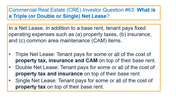
Prop 21
On Prop 21, at this point I have the following to say (there will of course be more):
- Prop 21 is bad policy which is unlikely to pass - even Governor Newsom opposed as he acknowledges further rent control will exacerbate the CA housing crisis - Prop 21 does NOTHING to increase the supply of housing.
- Prop 21 is unlikely to pass because it threatens home values
- Prop 21, if passed, won’t be as bad as feared
- MOST IMPORTANTLY: Passage of Prop 21 is already priced into the share prices of the CA multihousing REITS.
- If passed, rent control won't necessarily be perceived as bad. Germany has had rent control for decades. It's apartment REITs trade at MUCH HIGHER valuations than ESS, EQR, AVB.
1. Prop 21 - bad policy which won’t pass because it exacerbates the housing crisis rather than solving it. Wanna take a step toward solving it? Allow more flexible building. Even Governor Newsome understands this - he has opposed Prop 21.
Passage of Prop 21 would discourage the building of new apartment units as further rent control would reduce developer appetitive for building and access to capital.
Passage of Prop 21 will unleash a festival of unintended consequences - apartments will be converted to condos wherever possible - ESS can do 9,000 of them.
Beyond condo conversions, Prop 21 knocks units out of ‘circulation’. I know plenty of people who have rent controlled apartments in which they don’t even live (and can’t sublet) but who won’t give them up because they are so far below market. This is due to misguided rent control policies of the past - when apartment rents are significantly below market, apartments are hoarded.
2. Prop 21 threatens single family home values as rents, which are already cheap vs. the cost of homeownership (60+% increase in monthly housing expenditure required to go from renting to owning), will be even cheaper relative to homeownership. This will discourage rent by choice households from considering becoming homeowners (hurts demand) as they don’t want to give up the ‘economic ownership’ of their apartments. CA Housing policy has always favored the interests of Single Family Homeowners (read: VOTERS!) - 55% of households are owned.
In addition to reducing demand for homeownership, passage of Prop 21 could lead to an increase in the supply of homes available for sale as 1) owners of apartment buildings will convert units to condos where possible (as mentioned above, ESS could convert 15% of its units to condos).
3. Prop 21, if passed, almost certainly won’t be as bad as feared - it isn’t a blanket policy as municipalities will each have the opportunity to be rational. Prop 21 allows municipalities the (bad) option of enacting onerous rent control (beyond the statewide CPI + 5% in place today for renewals - landlords are free to mark units which turnover to market rates).
Some municipalities understand this better than others. While the republic of Santa Monica may be likely to impose strict rent control. ESS and the other REITs have no real presence in this submarket. SF Bay Area municipalities like Santa Clara and Sunnyvale, where ESS owns many apartment buildings, are aware of the growth opportunities ahead of them. It’s wants to continue to grow. By and large, it’s citizens/voters can afford the rent. These communities know better than to try to fix what isn’t broken.
4. Prop 21 passage is already priced in! What if it doesn’t pass? With yield spreads -i.e. apartment cap rate is +470 basis points above 10 year treasury for CA multihousing (vs. historical average of 280 bps) a ‘no growth’ scenario has already more than been priced into apartment REIT share prices.
Even under a draconian scenario whereby apartments built prior to 2006 are only allowed 3% per annum renewal rent hikes, and vacancies are only allowed to be filled 9% higher than previous rent, rents should still grow over 3% per year.
NOI/dividends will grow faster than 3% since the largest expense component, property taxes, grow at a maximum annual rate of 2% due to Prop 13.
Prop 13 has been best described as the Third Rail (‘untouchable subject’) of California politics - even Arnold couldn’t Terminate it. While split roll (Prop 15) targets some commercial properties (retail, office, industrial), multifamily is lumped in with single family homes and is NOT on the docket.
5. Germany is a rent-control market. Rents are only allowed to grow at a certain rate per year, generally less than 2% (in some market like Berlin rent control is even more onerous - massive housing shortage here and the free market is not allowed to function).
You can see below the steady but slow rent growth in Germany regardless of market cycles. German rents are under-market and even in economic downturns rents will grow (in almost all cases the tenant cannot leave and find a better deal). This is very different from US where rent can decline in a recession, and varies widely but also is much higher overall in bull cycles.
Despite this seeming negative, the public equity market looks upon German apartment REITs much more favorably than US investors currently look upon ESS/EQR/AVB. The reasons for this include:
a) while growth across the cycle is lower under rent control, market participants (I guess you can call them investors) seem to greatly prefer stability (willing to trade higher growth for stable 2% growth).
b) German investors are cognizant that they are buying units at a huge discount to replacement cost (despite low cap rate)
c) 10 yr German Bunds (interest rates) yield 120 basis points (1.2%) less than the US 10 year treasury. Interest rates are a key driver of cap rates.



